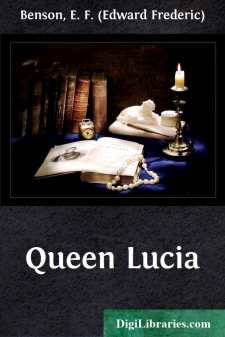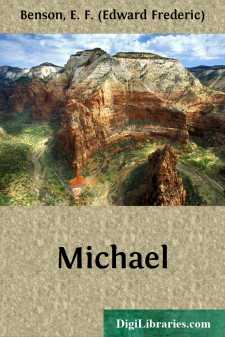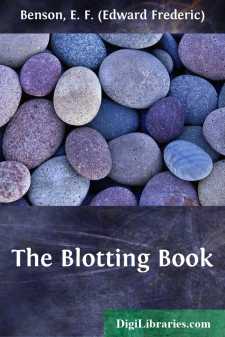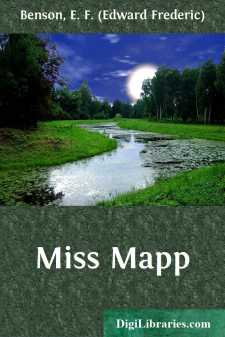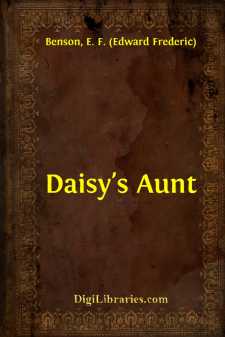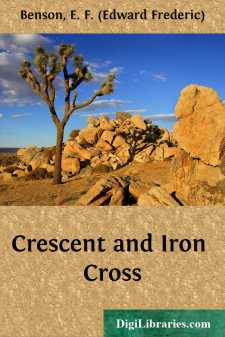Categories
- Antiques & Collectibles 13
- Architecture 36
- Art 48
- Bibles 22
- Biography & Autobiography 813
- Body, Mind & Spirit 142
- Business & Economics 28
- Children's Books 15
- Children's Fiction 12
- Computers 4
- Cooking 94
- Crafts & Hobbies 4
- Drama 346
- Education 46
- Family & Relationships 57
- Fiction 11829
- Games 19
- Gardening 17
- Health & Fitness 34
- History 1377
- House & Home 1
- Humor 147
- Juvenile Fiction 1873
- Juvenile Nonfiction 202
- Language Arts & Disciplines 88
- Law 16
- Literary Collections 686
- Literary Criticism 179
- Mathematics 13
- Medical 41
- Music 40
- Nature 179
- Non-Classifiable 1768
- Performing Arts 7
- Periodicals 1453
- Philosophy 64
- Photography 2
- Poetry 896
- Political Science 203
- Psychology 42
- Reference 154
- Religion 513
- Science 126
- Self-Help 84
- Social Science 81
- Sports & Recreation 34
- Study Aids 3
- Technology & Engineering 59
- Transportation 23
- Travel 463
- True Crime 29
Queen Lucia
Description:
Excerpt
Chapter ONE
Though the sun was hot on this July morning Mrs Lucas preferred to cover the half-mile that lay between the station and her house on her own brisk feet, and sent on her maid and her luggage in the fly that her husband had ordered to meet her. After those four hours in the train a short walk would be pleasant, but, though she veiled it from her conscious mind, another motive, sub-consciously engineered, prompted her action. It would, of course, be universally known to all her friends in Riseholme that she was arriving today by the 12.26, and at that hour the village street would be sure to be full of them. They would see the fly with luggage draw up at the door of The Hurst, and nobody except her maid would get out.
That would be an interesting thing for them: it would cause one of those little thrills of pleasant excitement and conjectural exercise which supplied Riseholme with its emotional daily bread. They would all wonder what had happened to her, whether she had been taken ill at the very last moment before leaving town and with her well-known fortitude and consideration for the feelings of others, had sent her maid on to assure her husband that he need not be anxious. That would clearly be Mrs Quantock's suggestion, for Mrs Quantock's mind, devoted as it was now to the study of Christian Science, and the determination to deny the existence of pain, disease and death as regards herself, was always full of the gloomiest views as regards her friends, and on the slightest excuse, pictured that they, poor blind things, were suffering from false claims. Indeed, given that the fly had already arrived at The Hurst, and that its arrival had at this moment been seen by or reported to Daisy Quantock, the chances were vastly in favour of that lady's having already started in to give Mrs Lucas absent treatment. Very likely Georgie Pillson had also seen the anticlimax of the fly's arrival, but he would hazard a much more probable though erroneous solution of her absence. He would certainly guess that she had sent on her maid with her luggage to the station in order to take a seat for her, while she herself, oblivious of the passage of time, was spending her last half hour in contemplation of the Italian masterpieces at the National Gallery, or the Greek bronzes at the British Museum. Certainly she would not be at the Royal Academy, for the culture of Riseholme, led by herself, rejected as valueless all artistic efforts later than the death of Sir Joshua Reynolds, and a great deal of what went before. Her husband with his firm grasp of the obvious, on the other hand, would be disappointingly capable even before her maid confirmed his conjecture, of concluding that she had merely walked from the station.
The motive, then, that made her send her cab on, though subconsciously generated, soon penetrated into her consciousness, and these guesses at what other people would think when they saw it arrive without her, sprang from the dramatic element that formed so large a part of her mentality, and made her always take, as by right divine, the leading part in the histrionic entertainments with which the cultured of Riseholme beguiled or rather strenuously occupied such moments as could be spared from their studies of art and literature, and their social engagements....


